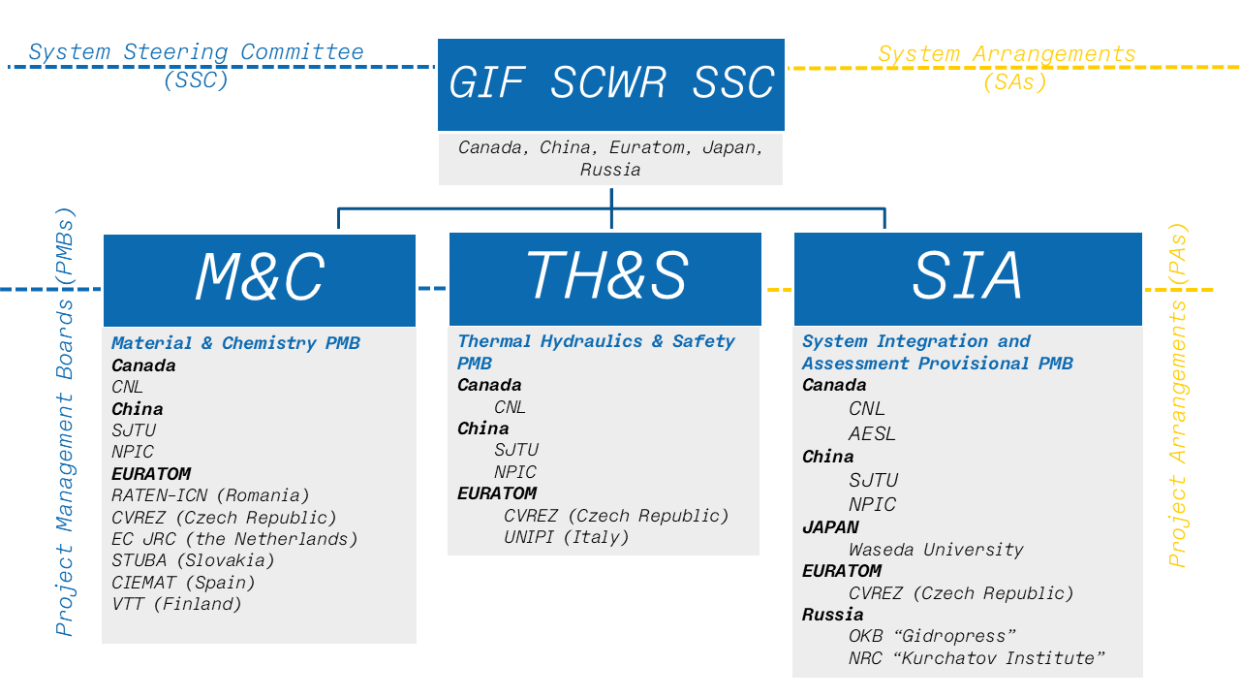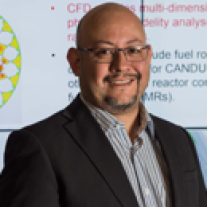Super Critical Water Reactors GIF System Steering Committee
The Super Critical Water Reactors System Steering Committee (SCWR SSC) was formed following the signing of the SCWR System Arrangement in 2006. Currently, five members of the Generation IV International Forum (GIF) are engaged in the activities of the SCWR SSC. This committee supervises four projects encompassing a wide array of subjects pertaining to Super Critical Water Reactors. The SCWR is the only water cooled reactor among the six Generation IV systems and is a relatively evolutionary approach from current light water reactors (LWRs) that compose the majority of the reactors operated today, it also benefits from the experience of modern fossil fueled plants that rely on a energy conversion system using super-critical water.
DISCLAIMER: The entry into force of the 2025 GIF Framework Agreement on 1st March 2025 brings changes to the GIF membership. The website will be updated in due course to reflect these changes.
Activities and Membership of the Super Critical Water Reactors GIF System Steering Committee
GIF SCWR SSC gathers five GIF Members. It oversees three R&D cooperation projects.
SCWR Projects

| Project Arrangement | Project Description | Effective Date | SIGNATORIES (GIF Member) | Chairs and co Chairs |
|---|---|---|---|---|
| SCWR materials and chemistry (M&C) |
| 2010 | AECL (CA) | Chair: SÁEZ MADERUELO, Alberto (CIEMAT, Euratom) Co-Chair: Open |
| SCWR thermal-hydraulics and safety (TH&S) |
| 2009 | NRCan, AECL (CA) | Chair: ZHAO, Xuebin (NPIC, China) Co-Chair: NAVA-DOMINGUEZ, Armando (CNL, Canada) |
| Provisional SCWR system integration and assessment (SIA) |
| 2017 | NRCan (CA) |
If you want to learn more about the Super Critical Water Reactor technology head to the SCWR System description page. If you want to learn more about the latest outcomes and international efforts carried out under the GIF SCWR SSC please refer to the most recent GIF Annual Report.
SCWR SSC Leadership & Technical Secretariat

Dr
Armando NAVA-DOMINGUEZ
Armando Nava Dominguez has a Bachelor’s degree in Energy Engineering, specialized in Nuclear Thermalhydraulics and a Master’s degree in Nuclear Thermalhydraulics. He joined CNL in 2005 as a Thermalhydraulics Analyst, specializing in code development and validation of the subchannel code ASSERT-PV. He joined the Canadian Super Critical Water Reactor (SCWR) team in 2011 as part of the Generation-IV International Forum (GIF) program. He is the Canadian member and co-chair of the SCWR Thermalhydraulics and Safety under GIF. He is currently the chairman of the system steering committee for the SCWR under GIF. At CNL, he is the Technical and Project Lead of the SCWR Gen IV project, and Head of the Advanced Reactor Technologies section. In addition, he has five years of experience in the private sector conducting deterministic and probabilistic safety analyses of nuclear power plants.
Dr
Alberto SÁEZ MADERUELO
Alberto Sáez-Maderuelo has been working as a researcher at Centro de Investigaciones Energéticas Medioambientales y Tecnológicas (CIEMAT) since 2009, focusing his efforts on the study of corrosion behavior of structural materials for nuclear applications. Specifically, Alberto has studied the behavior of materials in simulated environments of Pressurized Water Reactor (PWR) and Supercritical Water Reactor (SCWR). In addition, Alberto is the leader of the project management board on materials and chemistry and the co-chair of the system steering committee of the SCWR-Generation IV International Forum (GIF). Alberto also serves as the leader of the materials work package in the European Union-funded project ECC-SMART, which studies the corrosion behavior of different candidate materials for the fabrication of cladding for the future supercritical water-cooled small modular reactor (SCW-SMR).

Ms
Xiaoluo WANG
Xiaoluo WANG joined the GIF Technical Secretariat in 2025, where she serves as Technical Secretary for GFR System Steering Committee, GFR Project Management Boards (Conceptual Design & Safety; Fuel & Core Material), SCWR System Steering Committee, and SCWR Project Management Boards (Material & Chemistry; Thermal Hydraulics & Safety; System Integration & Assessment Provisional).
Prior to joining GIF, Xiaoluo started her professional career as an intern at IAEA, after which she worked as a nuclear engineer at Nuclear Power institute of China (NPIC), responsible for advanced nuclear fuel research and design. She has also worked at Ministry of Finance of China and China National Nuclear Corporation (CNNC), mainly focus on bilateral and multinational Cooperation initiatives.